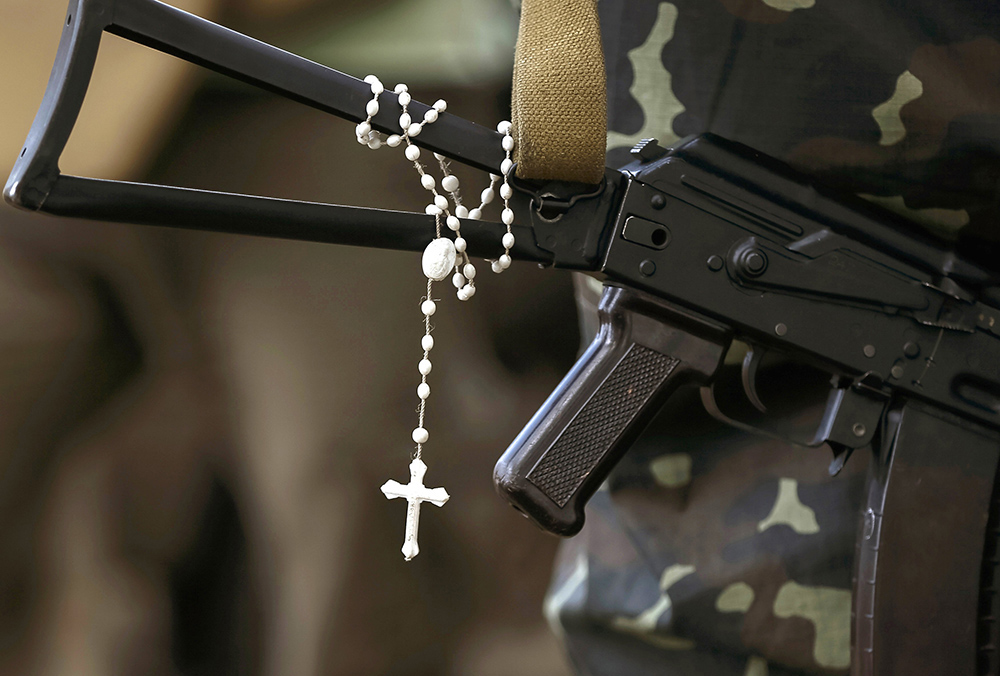
A rosary hangs from a machine gun in an undated file photo as Ukrainian soldiers stand at their positions near the Ukrainian town of Pervomaysk. (OSV News/Reuters/Gleb Garanich)
In my weekly newsletter yesterday (if you have not signed up to get it, you can do so by clicking here), I mentioned attending the College Theology Society meeting last week at Sacred Heart University in Fairfield, Connecticut. Today, I would like to focus on a panel at that conference: "War and Peace in Ukraine: Human Suffering, Moral Quandaries, and Geopolitical Implications."
Given Cardinal Matteo Zuppi's visit to the region in pursuit of peace this week, the panel was well-timed.
The first speaker was Tobias Winright, who teaches theology at Maynooth, the national seminary and Catholic university outside Dublin. He noted that this year marks the 60th anniversary of Pope John XXIII's 1963 encyclical, Pacem in Terris, written on the morrow of the October 1962 Cuban missile crisis.
Alas, Winright observed, there is still bellum in terris too: in Ukraine, Africa and the Middle East. We still must wrestle with the moral challenges posed by the fact of state-sponsored violence across national boundaries.
Winright noted that the U.S. bishops' statement "The Challenge of Peace: God's Promise and Our Response," issued on the 20th anniversary of Pacem in Terris, brought nonviolent witness into a relationship of complementarity with the just war tradition, in which the two serve to correct the limits of the other.
We have seen how people have abused the just war tradition for political ends, forgetting the many requirements it sets, and reducing them to a judgment of whether or not the cause is just. Winright noted that the criterion of comparative justice is almost entirely overlooked.
Advertisement
Finally, he suggested that the experience of the war in Ukraine suggests we might use the phrase "justified self-defense" rather than "just war," for that better captures the Ukrainian moral stance.
Merrimack College's M.T. Dávila focused on the issue of refugees, and it is always staggering to consider the numbers. Dávila said that according to the United Nations High Commissioner for Refugees, there were 87 million or 88 million displaced persons worldwide before the war, divided evenly between those who are internally displaced and those who have crossed a national border. The war in Ukraine added 16 million more to that number.
Dávila noted the diverse, and unjust, treatment some refugees received at Ukraine's border. Some countries did not want to open their borders to Syrian refugees who had fled war in their country and relocated in Ukraine.
She also noted that a large number of Ukrainian refugees have already returned to their country, which is not an option for millions of refugees elsewhere. How to guarantee that the crisis in Ukraine raises awareness and empathy for refugees around the world?
The third speaker was Laurie Johnston from Emmanuel College in Boston, and I found her presentation exciting because it raised an issue I had never thought of before: what just war theory has to say about the rise of private military contractors or mercenaries.
The success of peace settlements depends on the willingness of all participants to recognize that they have more to gain from peace than from war, but it is never really in the interest of private military contractors to make peace.
One of the ad bellum requirements of just war theory, that is, the moral rationales to fight a war in the first place, is the necessity it be fought by legitimate authority. Thomas Aquinas made a great deal about this requirement, living as he did at the end of a very violent period. The demand the war be declared by legitimate authority was intended to prevent the medieval Hatfields and McCoys from perpetrating violence.
Now, of course, even the U.S. government has employed mercenaries to evade budgetary and moral restrictions that apply to our regular military forces.
Johnston pointed out that even a few decades ago, mercenaries were considered a thing of the past. I remember as a child reading about the Hessian mercenaries the United Kingdom sent to fight in the U.S. Revolution and thinking how odd it must have been to risk one's life for a paycheck. Now, private militaries are back, and back with a vengeance, available to terrorize populations anywhere in the world.
Johnston explained that she, like Zuppi, is associated with the Sant'Egidio community, which has been active in various efforts to negotiate peace settlements. The success of such negotiations depends on the willingness of all participants to recognize that they have more to gain from negotiating peace than they do from continuing a war, but it is never really in the interest of private military contractors to make peace. This issue of mercenaries warrants great attention from moral theologians.
Those who wish to commit the Catholic Church exclusively to a nonviolent moral stance were on the ascendancy in this papacy, until Vladimir Putin ordered his troops to invade Ukraine. That act of unprovoked aggression reminded us all that there are rogue actors who do not care about peace or justice or human dignity.
Telling the people of Ukraine that their faith prevents them from defending their homes and their homeland would be morally obscene. What is more, to borrow a phrase from George Orwell, to be pacifist in this moment is to be objectively pro-fascist.
Fortunately, the traditional just war theory articulates a range of moral concerns in a systematic way, concerns that aim to preserve human dignity while recognizing the hard and horrible truth that we humans are as prone to violence as not. And as this panel demonstrated, just war theory is capable of adaptation and development to address new nightmares.








